WHAT OF FII ARS HENCE?
Page 16
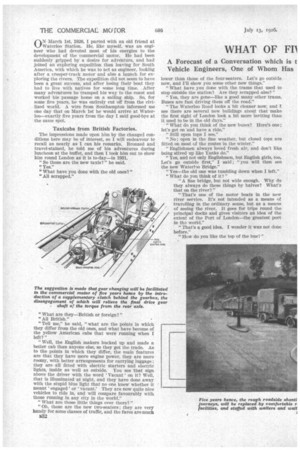
Page 17
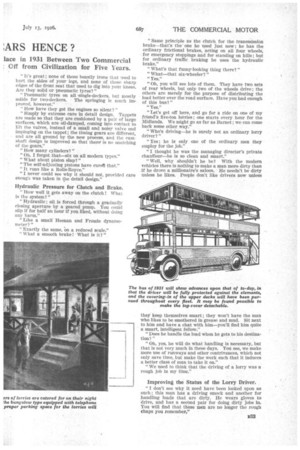
Page 18
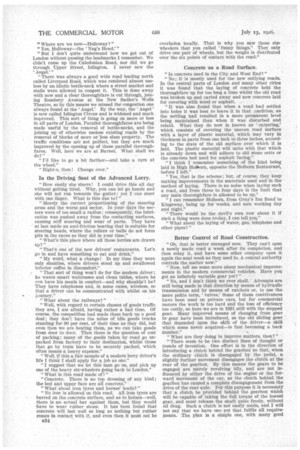
Page 19
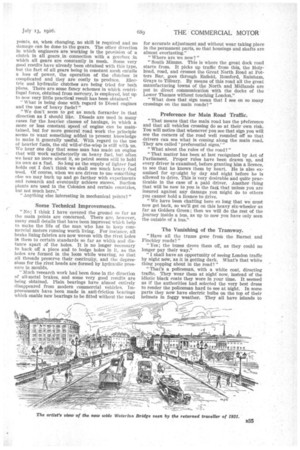
Page 20
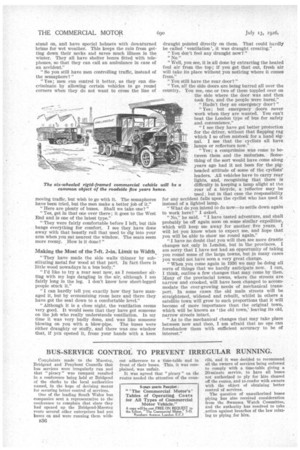
If you've noticed an error in this article please click here to report it so we can fix it.
piN March 1st, 1926, I parted with an old friend at IL/Waterloo Station. He, like myself, was an engineer who had devoted most of his energies to the development of the commercial motor. He had been suddenly gripped by a desire for adventure, and had joined an• exploring expedition then leaving for South America, with which he was to act as engineer, looking after a creeper-track motor and also a launch for exploring the rivers. The expedition did not seem to have been a great success, and after losing their boat they had to live with natives for some long time. After many adventures he tramped his way to the coast and worked his passage home on a sailing ship. So, for some five years, he was entirely cut off from the civilized world. A wire from Southampton informed me one day that on March 1st he would arrive at Waterloo—exactly five years from the day I said good-bye at the same spot.
Taxicabs from British Factories.
The impressions made upon him by the changed conditions here may be of interest, so I will endeavour to recall as nearly as I can his remarks. Bronzed and travel-stained, he told me of his adventures during luncheon at the buffet, and then I took him out to show him round London as it is to-day—in 1931.
"So those are the new taxis?" he said.
"Yes."
"That have you done with the old ones?"
"All scrapped."
"What are they—British or foreign?" "All British." • "Tell me," he said, "what are the points in which they differ from the old ones, and what have become of the yellow Arnerican cabs that were running when I left?"
"Well, the English makers bucked up and made a better cab than anyone else, so they got the trade. As to the points in which they differ, the main features are that they have more engine power, they are more• roomy, with better arrangements for carrying luggage ; they are all fitted with electric starters and electric lights, inside as well as outside. You see that sign above the driver with the word 'Vacant' on it? Well, that is illuminated at night, arid they have done away with the stupid blue light that no one knew whether it meant 'engaged' or vacant.' They are now quite nice vehicles to ride in, and will compare favourably with those running in any city in the world."
"What are those little things over there?" "Oh, those are the new two-seaters; they are very handy for some classes of traffic, and the fares are much lower than those of the four-seaters. Let's go outside now, and I'll show you some other new things."
"What have you done with the trams that used to stop outside the station? Are they scrapped also?"
"Yes, they are gone—like a good many other trams. Buses are fast driving them off the road."
"The Waterloo Road looks a bit cleaner now, and I see there are several new buildings about that make the first sight of London look a bit more inviting than it used to be in the old days."
"What do you think of the new buses? Here's one; let's get on'a.nd have a ride."
" Still open tops I see."
"No; open in the fine weather, but closed tops are fitted on most of the routes in the winter."
"Englishmen always loved fresh air, and don't like being stived up like Yanks do."
"Yes, and not only Englishmen, but English girls, too. Let's go outside first," I said ; "you will then see the new Waterloo Bridge."
"Yes—the old one was tumbling down when I left." "What do you think of it?"
"A fine bridge, but not wide enough. Why do they always do these things by halves? What's that on the river?"
"That's one of the motor boats in the new river service. It's not intended as a means of travelling in the ordinary sense, but as a means of seeing the river, it goes for trips round the principal docks and gives visitors an idea of the extent of the Port of London—the greatest port in the world."
"That's a good idea. I wonder it was not done before."
"How do you like the top of the bus?" "It's great ; none of those beastly irons that used t6 hurt the sides of your legs, and none of those sharp edges of the front seat that used to dig into your knees. Are they solid or pneumatic tyres?"
" Pneumatic tyres on all -single-deckers, but mostly solids for two-deckers. The springing is much improved, however."
"How have they got the engines so silent?
"Simply by extreme care in detail design. Tappets are made so that they are cushioned by a pair of large surfaces, which are oil-damped, coming into contact to lift the valves, instead of a small and noisy valve end impinging on the tappet ; the timing gears are different, and are all ground by the new process, and the camshaft design is improved so that there is no snatching • of the gears."
"How many cylinders?"
"Oh, I forgot that—six on all modern types." "What about piston slap?"
"The self-adjusting pistons have curet that."
"It runs like a Rolls-Royce."
"I never could see why it should not, provided care enough was taken in the detail design."
Hydraulic Pressure for Clutch and Brake.
"110w well it gets away on the clutch ! What is the system?"
" Hydraulic ; oil is forced through a gradually closing aperture by a geared pump. You could slip if for half an hour if you liked, without doing any harm."
"Like a smallHeenan and Fronde dynamo
meter?" .
"Exactly the same, on a reduced scale." "What a smooth brake! What is it?"
"Same principle as the clutch for the transmission brake—that's the one he used Sust now ; he has the ordinary frictional brakes, acting on all four wheels, for emergency stoppings and for standing on hills; but for ordinary traffic braking he uses the hydraulic brake."
"What's that funny-looking thing there?"
"What—that six-wheeler? "
"Yes"
"Oh, you will see lots of them. They have two sets of rear wheels, but only, two of the wheels drive; the others are merely for the purpose of distributing the load better over the road surface. Have you had enough of this bus?"
"Yes."
"Let's get off here, and go for a ride on one of my friend's five-ton lorries; one starts every hour for the Midlands. We might go as far as Barnet ; we can come back some other way."
"Who's driving—he is surely not an ordinary lorry driver?"
" Yes ; he is only one of the ordinary' men they employ for the job."
"I thought he was the managing director's private chauffeur—he is so clean and smart."
"Well, why shouldn't he be? With the modern vehicles there is nothing to make a man more dirty than if he drove a millionaire's saloon. He needn't be dirty unless he likes. People don't like drivers now unless they keep themselves smart ; they won't have the man who likes to be smothered in grease and mud. Sit next to him and have a chat with him—you'll find him quite a smart, intelligent fellow."
"Does he handle the load when he gets to his destination?"
"Oh, yes, lie will do what handling is necessary, but that is not very much in these days. You see, we make more use of runways and other contrivances, which not only save time, but make the work such that it induces a better class of man to take it on."
"We used to think that the driving of a lorry was a rough job in my time."
Improving the Status of the Lorry Driver.
"I don't see why it need have been looked upon as such; this man has a driving smock and another for handling loads that are dirty. He wears gloves to drive, and has a second pair for doing dirty jobs in. You will find that these men are no longer the rough chaps you remember," "Where are we now—Holloway?" "Yes, Holloway—the Nag's Head.'" "But I don't quite understand how we got out of London without passing the landmarks I remember. We didn't come up the Caledonian Road, nor did we go
through Upper Street, Islington. I never saw the 'Angel.'"
"There was always a good wide road leading north called Liverpool Road, which was rendered almost useless by an idiotic bottle-neck where a street market and stalls were allowed to congest it. This is done away with now and a clear thoroughfare is cut through, joining Rosebery Avenue at the New Sadler's Wells Theatre, so by this means we missed the congestion one always found at the Angel.' By the way, the ' Angel ' is now called Islington Circus and is widened and much improved. This sort of thing is going on more or less In all parts of London. Parallel thoroughfares are being made useful by the removal of bottle-necks, and the joining up of otherwise useless existing roads by the removal of blocks of more or less slum property. The traffic conditions are not perfect, but they are much improved by the opening up of these parallel thoroughfares. Well, here we are at Barnet. What shall we do?"
"I'd like to go a bit farther—and take a turn at the wheel."
"Right-o, then ! Change over."
In the Driving Seat of the Advanced Lorry.
"How easily she steers ! I could drive this all day without getting tired. Why, you can let go hands and she will not run towards the gutter ; yet I can steer with one finger. What is this due to?"
"Merely the correct proportioning of the steering arms and the worm and sector. In your days the sectors were of too small a radius; consequently, the lubrication was pushed away from the contacting surfaces, causing stiff steering and wear of parts. They have at last made an anti-friction bearing that is suitable for steering heads, where the rollers or balls do not form pits in the races as they did in your time."
"What's this place where all these lorries are drawn up?"
"That's one of the new drivers' restaurants. Let's go in and have something to eat and drink."
"My word, what a change! In my time they were only shanties, where drivers stood up and swallowed inferior coffee in discomfort."
"That sort of thing won't do for the modern driver ; he wants smart waitresses and clean tables, where he can have his meals in comfort—and why shouldn't he? They have telephones and, in some cases, wireless, so that a driver can be communicated with whilst on his • journey."
"What about the railways?"
"Well, with regard to certain classes of goods traffic they are, I am afraid, having rather a bad time. Of course, the competition had made them buck up a good deal; they don't have the miles of idle goods trucks standing for 90 per eent, of their time as they did, but even then we are beating them, as we can take goods from door to door. Then there is the question of cost of packing; many of the goods taken by road go unpacked from factory to their destination, whilst those that go by train have to be securely packed, which often means a heavy expense."
"Well, if this a fair sample of a modern lorry driver's life I think I shall apply for a job as one."
"I suggest that we let this man go on, and pick up one of the heavy six-wheelers going back to London." "What is this road made of?"
"Concrete. There is no top dressing of any kind ; the bed and upper face are all concrete."
"What about iron tyres and horses' hoofs?"
"No iron is allowed on this road. All iron tyres are barred on the concrete surface, and as to horses—well, there is no actual bar against them, but they would have to wear rubber shoes. It has been found that concrete will last well so long as nothing but rubber comes in contact with it, and even then it must not be B34 overladen locally. That is why you saw those six• wheelers that you called funny things." They only drive one pair of wheels, but the weight is distributed over the six points of contact with the road."
Concrete -as a Road Surface.
"Is concrete used in the City and West End?"
"No; it is mostly used for the new outlying roads. In the central parts of London and many other cities it was found that the laying of concrete held the thoroughfare up for too long a time whilst the old road was broken up and carted away and new concrete laid for covering with wood or asphalt.
"It was also found that when a road had settled into holes it was best to leave it in that zondition, as the settling had resulted in a more permanent level being maintained than when it was disturbed and relaid. What they do now is known as carpeting,' which consists of covering the uneven road surface with a layer of plastic material, which may vary in thickness in parts from one inch to three inches, according to the state of the old surface over which it is laid. The plastic material will unite with that which is already down and will adhere to old stone setts or the concrete bed used for asphalt facing."
"I think I remember something of the kind being laid in High Ho%orn, opposite the Holborn Restaurant, before I left."
"Yes, that is the scheme; but, of course, they keep making improvements in the materials used and in the method of laying. There is no noise when laying such a road, and from three to four days is the limit that any main thoroughfare is allowed to be up."
"I can remember Holborn, from Gray's Inn Road to Kingsway, being up for weeks, and men working day and night."
"There would be the devil's own row about it if such a thing were done to-day, I can tell you."
"What about the laying of water, gas, telephone and other pipes? "
Better Control of Road Construction.
"Oh, that is better managed now. They can't open a newly made road a week after its completion, and then relay it, and have some other company open it again the next week as they used to. A central authority controls the matter now."
"Now, tell me some more about mechanical improvements in the modern commercial vehicles. Have you got an infinitely variable gear yet?"
"No, and I don't think we ever shall. Attempts are still being made in that direction by means of hydraulic transmission and by means of ratchets or, to use the more polite term, valves.' Some of these contrivances have been used on private ears, but for commercial motors the work is too hard and the loss of efficiency too costly, so here we are in 1931 still with the stepped gear. Many improved means of changing from gear to gear have been introduced, so the old sliding gear that depended upon the skill of the driver—a skill which some never acquired—is fast becoming a back number."
"What are they doing to improve matters, then?"
"There seem to be two distinct lines of thought or trends of invention. One effort is in the direction of Introducing a clutch behind the gearbox so that, when the ordinary clutch is disengaged by the pedal, a slightly further movement disengages the clutch at the rear of the gearbox. By this means the gears to be engaged are merely revolving idly, and are not influenced by either the drive of the engine or the forward movement of the car, as the clutch behind the gearbox has caused a complete disengagement from the drive of the rear axle. For this purpose it is necessary that a clutch be provided behind the gearbox which will be capable of taking the full torque of the lowest gear, and must release the shaft quite freely, without oil drag. Such a clutch is not easily made, and I will not say that we have one yet that fulfils all requirements. The plan is a simple one, with many good
points, as, when changing, no skill is required and no damage can be done to the gears. The other direction in which engineers are working is the provision of a clutch in all gears .in connection with a gearbox in which all gears are constantly in mesh. Some very good results have already been obtained with this type, but the fact of all gears being in constant mesh entails a loss of power, the operation of the clutches is complicated and they are costly to produce. Electric and hydraulic clutches are being tried for both plans. There are some fancy schemes in which centrifugal force, obtained from mercury, is employed, but up to now very little practical result has been obtained."
"What is being done with regard tri Diesel engines and the use of heavy fuels?"
"We don't seem to get as much forrarder in that direction as I should like. Diesels are used in many eases for the heavier classes of haulage, in which a more or less constant speed of engine can be maintained, but for more general road work the principle seems to want something added to present knowledge to make it generally useful. With regard to the use of heavier fuels, the old will-o'-the-wisp is still with us. We hear one day that some man has made an engine that will work satisfactorily on heavy fuel, but often we hear no more about it, so petrol seems still to hold its own as a fuel. So long as the supply of lighter fuel holds out I don't think we shall see much heary.fuel used. Of course, when we are driven to use something else we may buck up and go farther with experiments and research and eventually achieve sucess. Suction plants are used in the Colonies and certain countries, but not much here."
"Anything else interesting in mechanical points?"
Some Technical Improvements.
" No; I think I have covered the ground so far as the main points are conCerned. There are, however, many small details that have been improved which help to make the life of the man who has to keep commercial motors running worth living. For instance, all brake lining fabrics are now woven with the rivet holes in them to certain standards so far as width and distance apart ,)f the holes. It is no longer necessary to hack off a piece and to bodge holes in it, as the holes are formed in the loom while weaving, so that all threads preserve their continuity, and the depressions for the rivet heads are formed by hydraulic pressure in mOulds.
"Much research work had been done in the direction of all-metal brakes, and some very good results are being obtained. Plain bearings have almost entirely disappeared .from modern commercial vehicles. Improvements have been made in anti-friction bearings which enable new bearings to be fitted without the need for accurate adjustment and without wear taking place in the permanent parts, so that housings and shafts are almost everlasting."
"Where are we now?"
"South Mimms. This is where the great dock road starts from. It picks up traffic from this, the Holyhead, road, and crosseS the Great North Road at Potters Bar, goes through Enfield, Romford, Rainham, Grays to Tilbury. By means of this road all the great manufacturing towns of the North and Midlands are put in direct communication with the docks of the Lower Thames without touching London."
"What does that sign mean that I see on so many crossings on the main roads?"
Preference for Main Road Traffic.
"That means that the main road has the preference and that all vehicles crossing do so at their own risk. You will notice that whenever you see that sign you will see the corners of the road well rounded off so that drivers can see what is coming along the main road. They are called 'preferential signs.'" "What about the rules of the road?"
"That matter has been at last recognized by Act of Parliament. Proper rules have been drawn up, and every driver is examined, before granting him a licence, to see that he knows them by heart. He is also examined for ey,rsight by day and night before he is allowed to drive. This is very desirable and quite practicable in the case of a paid driver. Another thing that will be new to you is the fact that unless you are insured against any damage you might do to others you cannot hold a licence to drive.
"We have been chatting here so long that we must now get back, so we'll get on this heavy six-wheeler as far as Golders Green ; then we will do the rest of the journey inside a bus, as up to now you have only seen the outside of a bus."
The Vanishing of the Tramway.
"Have all the trams gone froth the Barnet and Finchley roads?"
"Yes; the buses drove them off, as they could no longer pay their way."
"I shall have an opportunity of seeing London traffic by night now, as it is getting dark. What's that white thing popping about in the road?"
"That's a policeman, with a white coat, directing traffic. They wear them at night' now, instead of the idiotic black coats they wore in your time. It seemed as if the authorities had selected the very best dress to render the policeman hard to see at night. In some parts they now have electric bulbs on the top of their helmets in foggy weather. They all have islands to
stand on, and have special helmets with downturneci brims for wet weather. This keeps the rain from getting down their necks and saves much illness in the winter. They all have shelter boxes fitted with telephones, so that they can call an ambulance in case of an accident."
"So you still have men controlling traffic, instead of the semaphore?"
"Yes; men can control it better, as they can discriminate by allowing certain vehicles to go round corners when they do not want to cross the line of moving traffic, but wish to go with it. The semaphores have been tried, but the men make a better job of it." "Here are plenty of buses. Shall we take one?"
"Yes, get in that one over there; it goes to the West End and is one of the latest type."
"They were fairly comfortable before I left, but this bangs everYthing for comfort. I see they have done• away with that beastly rail that used to dig into your arm when you sat nearest the window. The seats seem more roomy. .How is it done?"
Making the Most of the 7-ft. 2-in. Limit to Width "They have made the side walls thinner by substituting metal far wood at that part. In fact there is little wood nowadays in a bus body."
"I'd like to try a rear seat tow, as I remember sitting with my legs dangling in the air, although I am fairly long in the leg. I don't know how short-legged people stuck it."
"I can hardly tell you exactly how they have managed it, but by economizing room here and there they have got the seat down to a comfortable level."
"Although it is a close night, the ventilation seems very good. It would seem that they have got someone on the job who really understands ventilation. In my time it was very badly done, and was like someone blowing on you with a blow-pipe. The buses were either draughty or stuffy, and there was one window that, if you opened it, froze your hands with a keen draught pointed directly on them. That could hardly be called ' ventilation ', it was draught creating." "You don't feel any draught now? "
"Well, you see, it is all done by extracting the heated foul air from the top; if you get that out, fresh air will take its place without you noticing where it comes from."
"You still have the rear door?"
"Yes, all the side doors are being barred all over the country. You see, one or two of them toppled over on the side where the door was and then took fire, and the people were burnt." "Hadn't they an emergency door?"
"Yes; but emergency doors never work when they are wanted. You can't beat the London type of bus for safety and convenience."
"I see they have got better protection for the driver, without that flapping rag which i so often mistook for a hand signal. I see that the cyclists all have lamps or reflectors now." .
"Yes; a compromise was come to between them and the motorists. Something of the sort would have come along years ago had it not been for the pigheaded attitude of some of the cyclists' leaders. All vehicles have to carry rear lights, and, recognizing that there is difficulty in keeping a lamp alight at the rear of a bicycle, a reflector may be used ; but in that ease the responsibility
for any accident falls upon the cyclist who has used it instead of a lighted lamp. "What do you intend to do now—to settle down again to work here?" I asked.
"No," he said. "I have tasted adventure, and shall probably be off again soon on some similar expedition, Which will keep me away for another five years. I will let you know when to expect me, and hope that you will be able to show me round again." "I have no doubt that you will then see more drastic changes not, only in London, but in the provinces. I am sorry that I have not had an opportunity of taking you round some of the large towns, but in many cases you would not have seen a very great change.
"When you come again in 1936 we may be doing all sorts of things that we hardly anticipate now. I can, I think, outline a few changes that may come by then. Many of the provincial towns, where the streets are narrow and crooked, will have been changed to accommodate the ever-growing needs of mechanical transport. In some eases the old main streets will be straightened, widened and rebuilt, whilst in others a satellite town will grow to such proportions that it will become of more importance than the original town, which will be known as 'the old town,' leaving its old, narrow streets intact.
"As to the mechanical changes that may take place between now and then, I am afraid that no one can foreshadow them with sufficient accuracy to be of interest."






























